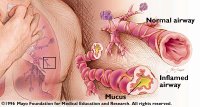Know Your Food Allergies
Individuals who suffer allergic reactions to a particular food need to be especially cautious because a food allergy can trigger anaphylactic shock. This potentially life-threatening condition is characterized by difficulty breathing and a dangerous drop in blood pressure.
Milder symptoms such as itching, hives and swelling may also be experienced. However, there is no way to know whether a person with a food allergy is likely to have a mild or severe reaction after eating the problem food. Symptoms that begin as mild to moderate can quickly intensify, becoming much more severe. Therefore, the only effective treatment option for a food allergy is avoidance.
Avoidance involves the complete removal of harmful foods from the diet. It requires careful and constant consideration of packaged food ingredients as well as the cooking procedures and ingredients used at restaurants. The knowledge of alternate names related to a problem food is also essential.
Many individuals confuse food allergy with food intolerance, which is much more common and not as severe. Food intolerance involves the inability of the body to digest a food or food component, leading to symptoms of discomfort (e.g., stomach cramping) but that pose little danger. Food intolerance often allows the individual to eat small portions of a problem food without experiencing symptoms. With a food allergy, even a very small portion of a food allergen can cause an allergic reaction.
True food allergies occur in roughly 1 to 2 percent of adults and 3 to 8 percent of children, according to the Asthma and Allergy Foundation of America. About 90 percent of all food allergies have been traced to the following foods:
1) Cow’s milk
2) Eggs
3) Peanuts
4) Tree nuts (e.g., almonds, walnuts)
5) Wheat
6) Soybeans
7) Fish
8) Shellfish
A physician can help to determine which food is causing a patient’s allergic reaction by using tests such as the skin test or the double blind oral food challenge. After successfully identifying the culprit food, a person must remove the food entirely from their diet.














3 Comments:
Allergy is one kind of reactions ato our body,so many kinds of allergy actually,so we need to avoid to attack our allergy,,allergy kits help us to protect our immune system to any kinds of allergy.
Hi,
Here at, Disease.com, we have worked with elite organizations who strive to find a cure for diseases and infections. After reading through your website, it is clear your organization shares the same passion we do for spreading the awareness for Asthma. Disease.com is a website dedicated to the preventions and treatments of diseases, as well as an established, medical news outlet. If you could, please list us as a resource or host our social book mark button, it would be much appreciated. You fight the cause, we'll spread the awareness.
If you need more information please email me with the subject line as your URL.
Thank You,
Sharon Vegoe
Thanks for the post. I would suggest for those who suffer from various types of allergies to eat more fruits and vegetables like carrots, tomatoes, oranges, apples, grapes and other useful products. The main thing is to eat the "correct" food with the less number of any types of additional substances.
Post a Comment
<< Home